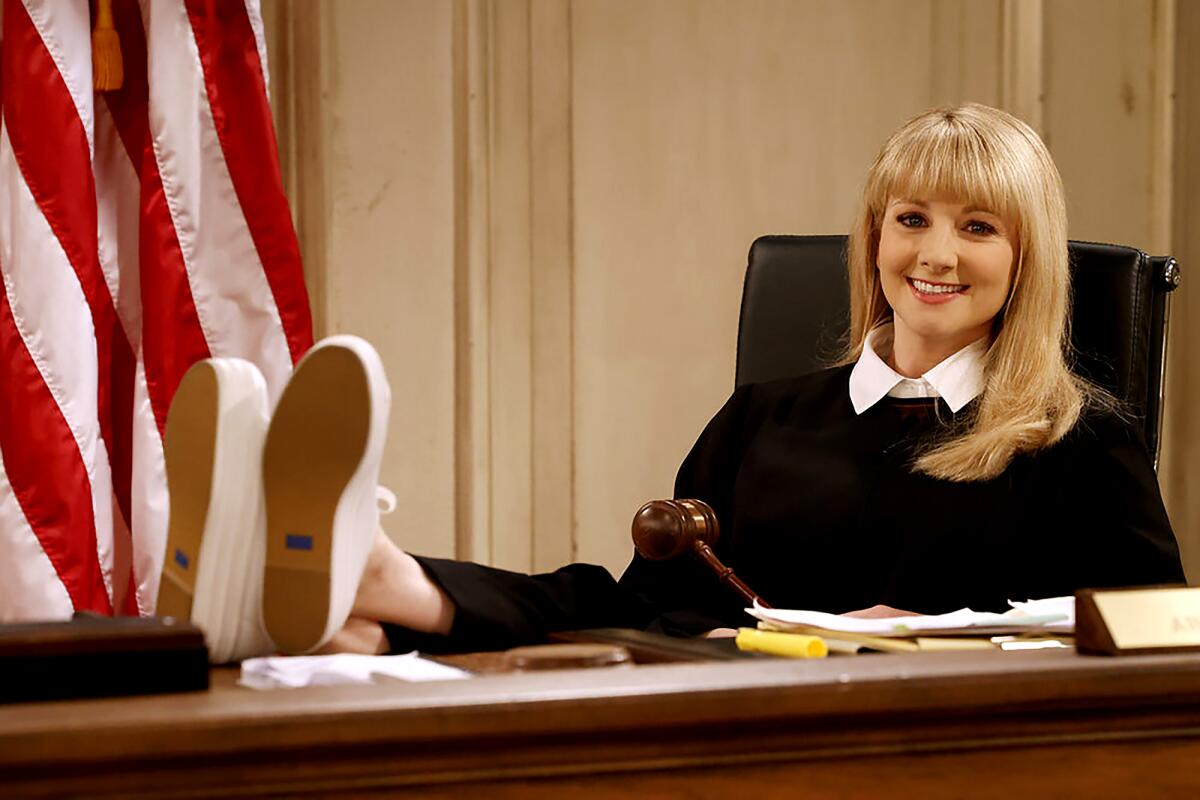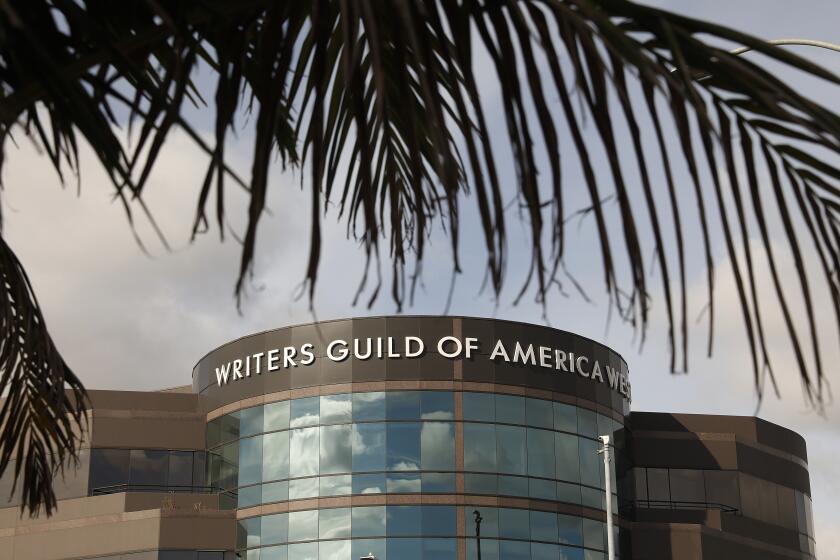Hollywood studios plan for a writers’ strike — even before negotiations have started

Last month, the long-running 1980s NBC show “Night Court” got a new life. The reboot was critically well received and a second season was ordered. But precisely when writers and crew will resume filming is up in the air. NBC executives are in talks with Warner Bros. and other producing partners about the potential effects of a strike on the show and the costs they might incur, said a person familiar with the show who was not authorized to comment.
The discussions are just the latest example of how studios and networks are girding for a potential walkout by members of the Writers Guild of America, which would be the first since the 100-day strike that roiled Hollywood in 2007-08.
The contract for WGA members does not expire until May 1. But negotiations, set to start March 20, are expected to be fraught, as both sides remain sharply divided over how writers are compensated in the streaming age. Adding to the labor tensions: Unions representing actors and directors also expect contentious negotiations with the studios when their contracts expire June 30.
To be sure, it’s too early to say what will occur, and a strike is not inevitable.
But studios, networks and producers are nonetheless preparing for the worst through a variety of contingency plans that include accelerating production schedules, stockpiling scripts and boosting international productions.
In a sign of the anxiety, some agents are reporting a flurry of activity among their writer clients, many of whom are eager to make sure they can sell any projects before a potential walkout.
“It’s on everybody’s mind, and many are nervous. They want to make the most effective moves with projects,” said Allan Haldeman, partner and co-head of the TV literary department at United Talent Agency. “Timing is always a component of strategy and the potential of a strike has added a new wrinkle to that process.”
Writers meet today to discuss the issues they expect will be at the center of difficult contract negotiations with the studios this spring.
John August, a writer on the WGA bargaining committee, told listeners of his “Scriptnotes” podcast this month that studios and networks are already preparing for what might happen — even though the WGA hasn’t decided on proposals for the talks.
“You see them opening writers rooms early; they are trying to get scripts in by May 1,” August said.
Some entertainment attorneys concur, saying studios are looking at scripts that were due after May 1, and trying to see if they can adjust those deadlines.
“Producers are bumping up those schedules with the writers, making sure as much is done as possible,” said Amy Stein Simonds, a partner in Pryor Cashman’s Media and Entertainment Group.
One consideration for studios: Even if only writers go on strike, scripted production across the board would be halted. Studios typically need writers during production for any rewriting that occurs.
As another contingency measure, studios also are shuffling schedules and moving production dates to wrap projects before a potential work stoppage.
Most of the changes affect TV productions as opposed to feature films, which have a much longer lead time.
Sony Pictures Television, which produces such shows as “The Good Doctor” for ABC, “S.W.A.T.” on CBS and Fox’s “Fantasy Island,” is trying to get material in before May, one person with knowledge of its plans said. Fox Entertainment, producer of “The Masked Singer” and other reality and unscripted shows, also is looking to move up productions so they are completed before any walkout, said a source not authorized to speak publicly.
Meanwhile, producers also are reaching out to entertainment industry attorneys for advice on how to prepare for a possible work stoppage and indemnify them from any liabilities they could face from production disruptions.
“We’re just really making sure that ... if things need to come to a halt, there’s adequate protections” for producers, said entertainment attorney Elsa Ramo, who represents independent producers.
Directors are warning this will be a tough year for labor talks as studios cut staff and productions.
The Alliance of Motion Picture and Television Producers declined to comment on strike preparation plans but said in a statement: “Our focus is on negotiating a fair deal with the guilds.”
Some studios began planning for a possible writers’ strike late last year by ordering second seasons of shows earlier than usual so that they could get a head start on production, one agent said.
For example, NBC picked up a second season of the popular sci-fi reboot “Quantum Leap” in December, in part so that it could get an early start on the second season well before May 1, said a person close to the production who was not authorized to comment.
Such planning is key for studios, networks and producers because production delays or cancellations can be very costly.
“If there is a strike, it could be hugely detrimental,” said Stein Simonds, who represents producers. “You’ve got actor schedules that you’re relying on, same thing with directors. There’s all these things that are worked out months and months in advance. To put a hold on that, everything gets delayed and messed up and you kind of have to start from scratch.”
Despite strike fears, there isn’t as much stockpiling of scripts as in previous bargaining cycles because studios had already accelerated production after the pandemic shutdown, industry experts said.
“It seems as though they’re relying on what has already been done in the past during these last couple years in order to make sure that they’re covered, if and when there is a strike,” Stein Simonds said.
Studios and networks often make contingency plans such as stockpiling scripts or shifting schedules ahead of a possible strike.
In previous strikes, including in 1988, networks were forced to delay their fall schedules. The 2007-08 writers’ strike, which reached 100 days, halted several network productions.
As they’ve done previously, some studios and producers are looking to reality or unscripted shows as a potential replacement for scripted fare that would be disrupted by a work stoppage. Reality TV programs — including Donald Trump’s “The Apprentice” — got a big boost after the 2007 strike.
Some are looking to make international content that would be outside the WGA’s jurisdiction.
“There’s an increased interest in local-language production,” said Dan Stone, entertainment industry attorney at Greenberg Glusker. “Domestic producers are working with foreign talent to set up projects that will shoot overseas.”
Times staff writers Wendy Lee and Ryan Faughnder contributed to this report.
Inside the business of entertainment
The Wide Shot brings you news, analysis and insights on everything from streaming wars to production — and what it all means for the future.
You may occasionally receive promotional content from the Los Angeles Times.
More to Read
Inside the business of entertainment
The Wide Shot brings you news, analysis and insights on everything from streaming wars to production — and what it all means for the future.
You may occasionally receive promotional content from the Los Angeles Times.









